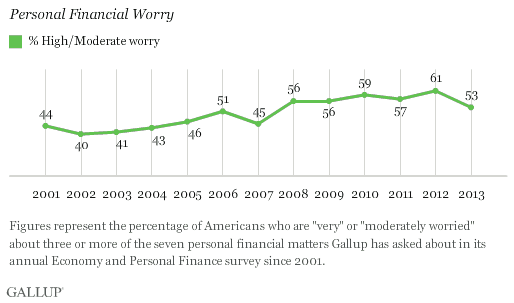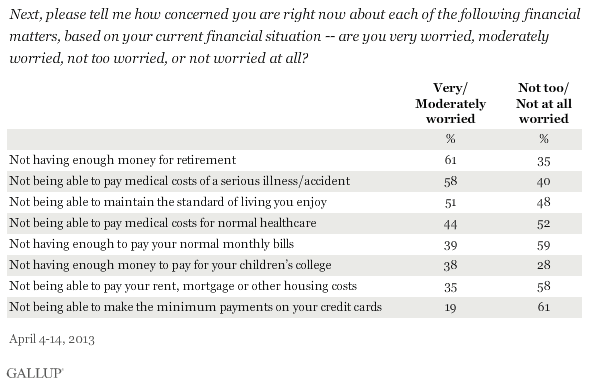PRINCETON, NJ -- Americans' financial worry has eased to the lowest level since before the recession. Gallup classifies 53% of Americans as highly or moderately worried about their finances, down from a peak of 61% a year ago, and the lowest since 45% in 2007.

The results are based on Gallup's annual Economy and Personal Finance survey, conducted each April beginning in 2001. As part of the survey, Gallup has asked Americans how much they worry about seven different personal financial matters, including retirement, maintaining their current standard of living, medical costs, housing costs, and paying normal monthly bills.
Gallup then creates a Financial Worry Index based on the number of financial matters respondents say they are "very" or "moderately worried" about. Thus, the score ranges from 0 for those who did not worry about any of the matters to 7 for those who worried about all of them.
This year, 25% of Americans are worried about six or seven of the seven items -- putting them in the "highly worried" category. Another 28% worry about three to five items and are classified as "moderately worried." The remaining 47% have few financial worries, including 23% who are worried about none of the seven items.
Americans were generally less worried about financial matters before the 2008-2009 recession than they have been since. A maximum of 51% were highly or moderately worried about their finances from 2001-2007, compared with a range of 53% to 61% since then.
The trends based on analysis of specific financial concerns generally mirror those Gallup has found in Americans' self-reports of their personal finances.
BIG TRENDS: Read more in our ongoing series The New American Consumer
Retirement, Serious Medical Condition, or Accident Top Financial Worries
Retirement savings and paying medical costs in the event of a serious illness or accident are most worrisome to Americans, out of the eight specific financial matters Gallup now measures -- the seven items included in the index plus college savings, which has been asked since 2007. Sixty-one percent are very or moderately worried about not having enough money for retirement and 58% are worried about not being able to pay costs associated with a serious medical issue. A majority are also worried about not being able to maintain their standard of living. Americans are least worried about making minimum payments on their credit cards.

The relative rank order of the financial matters has been highly consistent over time. In fact, retirement has been the top worry each of the 13 times Gallup has asked about the list, with serious medical costs ranking second each time. Making minimum credit card payments has been the least worrisome financial matter in each survey.
Americans are less likely to say they are worried about each of the eight financial matters than they were in 2011 and 2012, and, apart from college savings, worry about each item is also lower now than in 2010.
Worry about having enough for retirement, for example, is down to 61% this year after holding right around 66% each of the last four years. That may partly reflect the recovery of the stock market, which has reached record highs this year. However, Americans are still more worried about retirement funds now than before the recession, when an average of 56% were.
Implications
Americans are becoming less worried about a range of financial matters and, in a broad sense, are less worried about their personal finances now than at any time since the 2008-2009 recession. Still, the level of financial worry remains elevated to pre-recession levels, even as the economy is improving in many respects, including home values and stock values. And though still high on an absolute basis, the unemployment rate is much lower now than a few years ago. Yet economic growth remains sluggish, and it may take an economy firing on all cylinders to restore Americans' confidence in their personal finances to what it was prior to the economic downturn.
Gallup will take a closer look at financial worry by demographic group in a forthcoming article, to see which groups are more confident in their ability to meet the most important financial challenges Americans face.
Survey Methods
Results for this Gallup poll are based on telephone interviews conducted April 4-14, 2013, with a random sample of 2,017 adults, aged 18 and older, living in all 50 U.S. states and the District of Columbia.
For results based on the total sample of national adults, one can say with 95% confidence that the margin of sampling error is ±3 percentage points.
Interviews are conducted with respondents on landline telephones and cellular phones, with interviews conducted in Spanish for respondents who are primarily Spanish-speaking. Each sample of national adults includes a minimum quota of 50% cellphone respondents and 50% landline respondents, with additional minimum quotas by region. Landline telephone numbers are chosen at random among listed telephone numbers. Cellphone numbers are selected using random digit dial methods. Landline respondents are chosen at random within each household on the basis of which member had the most recent birthday.
Samples are weighted to correct for unequal selection probability, nonresponse, and double coverage of landline and cell users in the two sampling frames. They are also weighted to match the national demographics of gender, age, race, Hispanic ethnicity, education, region, population density, and phone status (cellphone only/landline only/both, cellphone mostly, and having an unlisted landline number). Demographic weighting targets are based on the March 2012 Current Population Survey figures for the aged 18 and older U.S. population. Phone status targets are based on the July-December 2011 National Health Interview Survey. Population density targets are based on the 2010 census. All reported margins of sampling error include the computed design effects for weighting.
In addition to sampling error, question wording and practical difficulties in conducting surveys can introduce error or bias into the findings of public opinion polls.
View methodology, full question results, and trend data.
For more details on Gallup's polling methodology, visit www.gallup.com.
